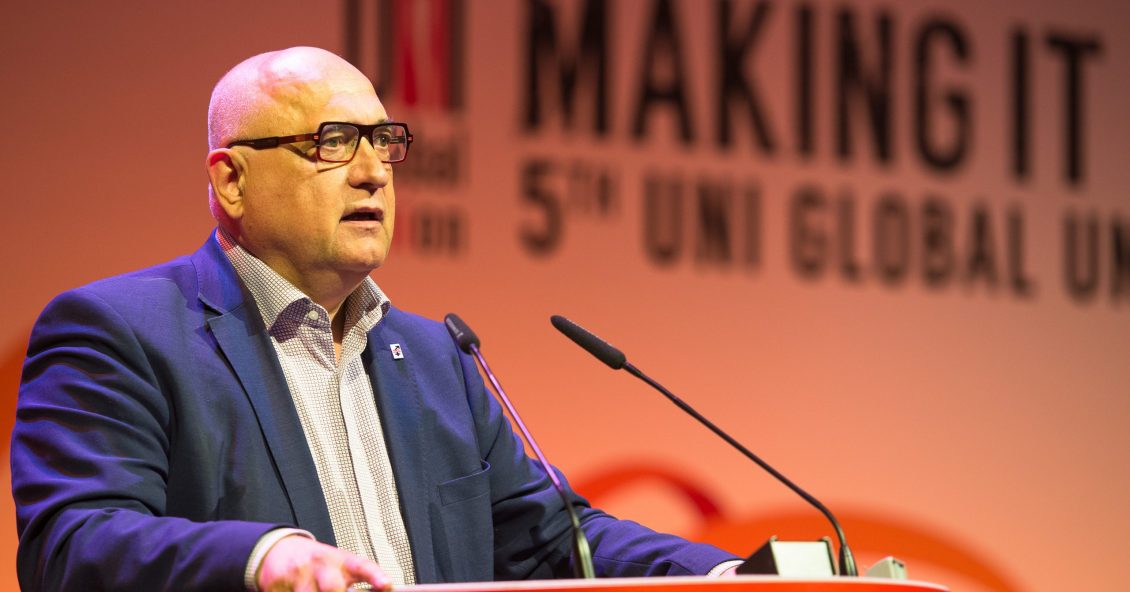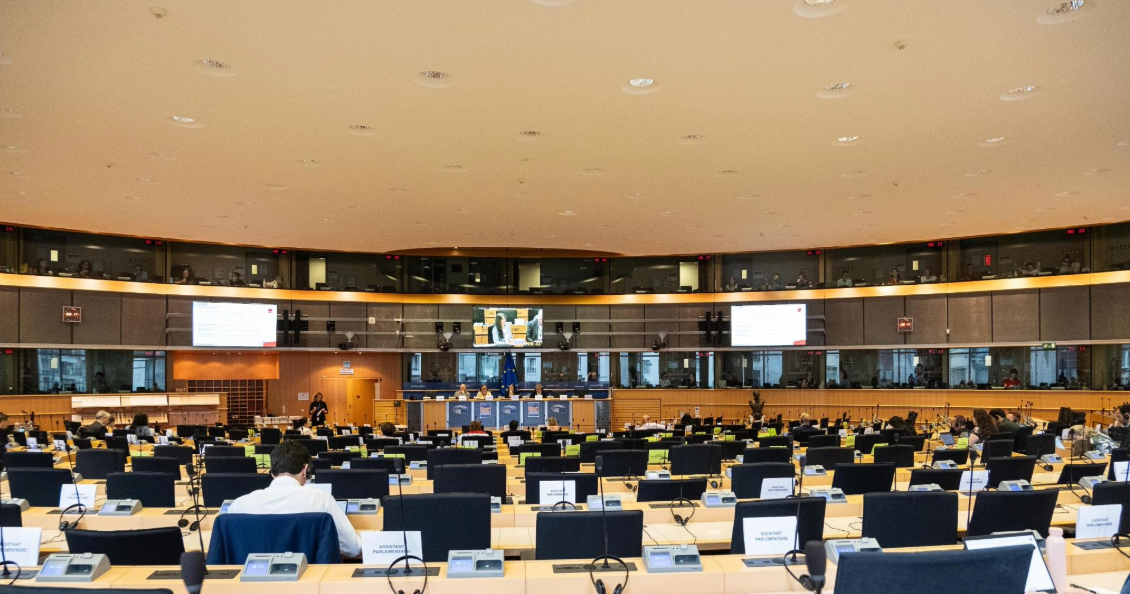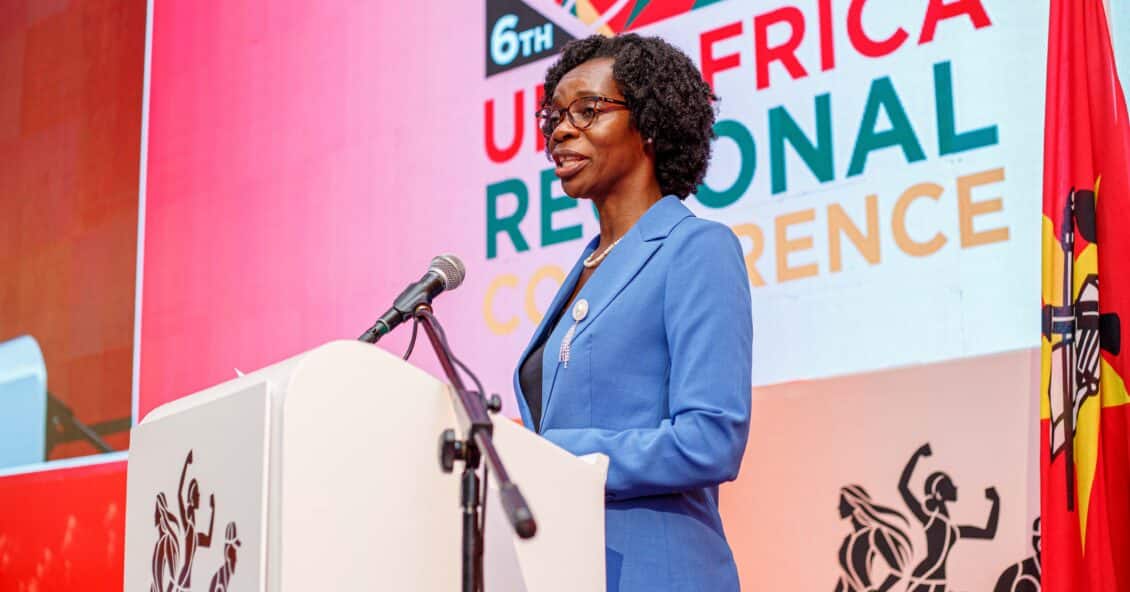Rudy de Leeuw, President of the ETUC and the Belgian General Federation of Labour – FGTB-ABVV, used the platform of the UNI World Congress in Liverpool to call for the unwavering solidarity of trade unions during this difficult era.
Stronger and better mobilising and organising of workers is the key to surviving this crucial moment for trade unionism, especially in Europe. Recent elections in Europe, rising xenophobia and anti-European sentiment has sought to divide workers, but trade unionists must fight to overcome this.
Calling for a renewal of trade union vigour – appealing to young people, women and ethnic minorities, in particular – de Leeuw highlighted several priorities in order to better defend workers from austerity and future crises.
De Leeuw said that the economic model must be changed and moved away from one encompassing austerity and neoliberalism, to a more progressive model. According to de Leeuw, this is the only way to fight unemployment and create quality jobs, especially for precarious workers.
Raising wages is also a remedy to rectify austerity and attacks on trade unions. Higher wages will provide an economic stimulus for sustainable growth, push for social justice and help tackle inequalities. De Leeuw underscored the acute need to address wage divides within countries, but also between countries to ensure that workers operating in different countries are not paid unequally. This is why the ETUC is pushing for a European alliance for upwards wage convergence, a campaign which will follow the successful Pay Rise Campaign.
De Leeuw also emphasised the need for a just transition towards a low carbon economy, fair globalisation ad fair digitalisation. Channelling the words of Frances O’Grady, de Leeuw stated that “we have a technology of the 21st century, which is creating labour conditions of the 19th century,” and trade unions must do all we can to combat this.
In order to do so, it is clear that new tools are needed to shape the future. The European Pillar of Social Rights is the first step to help reinstate the EU social model and rebuild it after it was hit by austerity and unsocial reforms. The ETUC believes that it is necessary for the European Union to implement the priorities of the Pillar into the EU’s treaties.
De Leeuw also pinpointed the need to solidify trade unions’ future relationship with the post-Brexit UK to make sure that British workers’ rights are not adversely affected and to work together to protect Europe from social fiscal and tax dumping.
Finally de Leeuw called for solidarity with refugees because it was a trade unionist’s duty to set a humane example to the rest of society.
Rudy de Leeuw, President of the ETUC and the Belgian General Federation of Labour – FGTB-ABVV, used the platform of the UNI World Congress in Liverpool to call for the unwavering solidarity of trade unions during this difficult era.
Stronger and better mobilising and organising of workers is the key to surviving this crucial moment for trade unionism, especially in Europe. Recent elections in Europe, rising xenophobia and anti-European sentiment has sought to divide workers, but trade unionists must fight to overcome this.
Calling for a renewal of trade union vigour – appealing to young people, women and ethnic minorities, in particular – de Leeuw highlighted several priorities in order to better defend workers from austerity and future crises.
De Leeuw said that the economic model must be changed and moved away from one encompassing austerity and neoliberalism, to a more progressive model. According to de Leeuw, this is the only way to fight unemployment and create quality jobs, especially for precarious workers.
Raising wages is also a remedy to rectify austerity and attacks on trade unions. Higher wages will provide an economic stimulus for sustainable growth, push for social justice and help tackle inequalities. De Leeuw underscored the acute need to address wage divides within countries, but also between countries to ensure that workers operating in different countries are not paid unequally. This is why the ETUC is pushing for a European alliance for upwards wage convergence, a campaign which will follow the successful Pay Rise Campaign.
De Leeuw also emphasised the need for a just transition towards a low carbon economy, fair globalisation ad fair digitalisation. Channelling the words of Frances O’Grady, de Leeuw stated that “we have a technology of the 21st century, which is creating labour conditions of the 19th century,” and trade unions must do all we can to combat this.
In order to do so, it is clear that new tools are needed to shape the future. The European Pillar of Social Rights is the first step to help reinstate the EU social model and rebuild it after it was hit by austerity and unsocial reforms. The ETUC believes that it is necessary for the European Union to implement the priorities of the Pillar into the EU’s treaties.
De Leeuw also pinpointed the need to solidify trade unions’ future relationship with the post-Brexit UK to make sure that British workers’ rights are not adversely affected and to work together to protect Europe from social fiscal and tax dumping.
Finally de Leeuw called for solidarity with refugees because it was a trade unionist’s duty to set a humane example to the rest of society.


